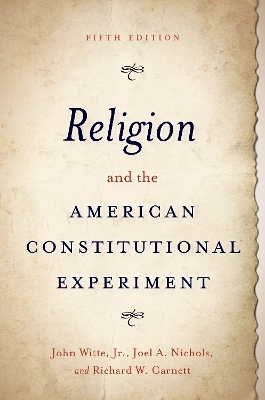
Religion and the American Constitutional Experiment
Oxford University Press Inc (Verlag)
978-0-19-758762-1 (ISBN)
Clear, comprehensive, multidisciplinary, and balanced, this classic volume is an ideal classroom text. This new 5th edition addresses fully the new hot-button issues and cases on religious freedom versus sexual liberty; religious worship in the time of COVID; freedom of conscience and exemption claims; state aid to religion; religious monuments and ceremonies in public life; and the rights and limits of religious groups.
John Witte, Jr. is Woodruff University Professor, McDonald Distinguished Professor, and Director of the Center for the Study of Law and Religion at Emory University. A leading scholar of legal history, human rights, and law and religion, he has published 300 articles and 40 books, in 15 languages, including The Reformation of Rights; Christianity and Human Rights; Religion and Human Rights; No Establishment of Religion; Church, State, and Family; Faith, Freedom, and Family; and The Blessings of Liberty. Joel A. Nichols is Interim Dean and Mengler Chair in Law at the University of St. Thomas (MN). His work draws upon his degrees and expertise in both law and theology. He has published three books and more than two dozen articles, typically on the intersection of law and religion. Richard W. Garnett is Paul J. Schierl/Fort Howard Corporation Professor of Law, Concurrent Professor of Political Science, and Director of the Program on Church, State, and Society at the University of Notre Dame, where he teaches and writes about religious freedom, constitutional and criminal law, and other matters.
List of Tables ix
Preface xi
Introduction
1 The American Experiment in Historical Context
The First Millennium
The Papal Revolution
The Protestant Reformation
Religious Establishment versus Religious Freedom in Europe
Colonization and Experimentation
2 The Theology and Politics of the Religion Clauses
Puritan Views
Evangelical Views
Enlightenment Views
Civic Republican Views
Summary and Conclusions
3 The Essential Rights and Liberties of Religion
Liberty of Conscience
Free Exercise of Religion
Religious Pluralism
Religious Equality
Separation of Church and State
Disestablishment of Religion
Summary and Conclusions
4 Forging the First Amendment Religion Clauses
Religion and the Continental Congress
The 1787 Constitutional Convention
Ratification and Proposed Amendments
Drafting the First Amendment Religion Clauses
"Original Intent": Interpreting the Final Text
Summary and Conclusions
5 The Free Exercise of Religion: Mapping the Doctrinal Terrain
Bringing a Free Exercise Case
Factual Clusters of Free Exercise Cases
Shifting Standards of Review in Free Exercise Cases
vi Contents
6 First Amendment Religious Exercise, Expression, and Exemption
Free Exercise and Polygamy (1879- 1890)
Free Exercise and Conscientious Objection (1918- 1971)
Freedom and Equality of Religious Expression (1940- 2015)
Liberty of Conscience and Free Exercise Exemptions (1943- 1989)
Summary and Conclusions
7 The Free Exercise of Religion: Neutrality, Nondiscrimination, and Statutory Rights
Neutralizing the Free Exercise Clause (1982- 1990)
Neutrality and No State Discrimination Against Religion (1993- )
Neutrality and Nondiscrimination in State Aid to Religious Education
Neutrality and Nondiscrimination in the Time of Covid
State Neutrality in Balancing Religious Liberty and Sexual Liberty
Free Exercise of Religion as a Statutory Right (1993- )
RFRA Cases in the Supreme Court
RLUIPA Cases in the Supreme Court
Summary and Conclusions
8 Modern Establishment Law: Mapping the Doctrinal Terrain
Bringing an Establishment Clause Case
Mapping the Establishment Clause Cases
Separationism
Accommodationism
Neutrality and the Lemon Test
Endorsement
No Coercion
Equal Treatment/ Equal Access
History and Tradition
Summary and Conclusions
9 Religion and Public Education: No Establishment of Religion, But Equal Access for Religion
Separationist Cases (1948- 2000)
Equal Access Cases (1981- )
Limits on Equal Access?
Summary and Conclusions
10 Government and Religious Education: From Accommodation to Separation to Equality
Accommodationist Cases (1908- 1977)
Separationist Cases (1971- 1985)
Equal Treatment Cases (1983- 2002)
Statutes, Free Exercise, and Equal Access Rights (2004- )
Summary and Conclusions
11 Religion and Public Life
Sabbath Day Rules 282
Legislative Chaplains and Prayers
Religious Symbols
Patterns and Principles
Summary and Conclusions
12 The Freedoms of Religious Organizations
Religious Polity and Structures
Religious Structures
Legal Structures
Religious Property Disputes
Standard Legal Principles (1815- 1914)
Deference (1872- 1976)
Neutral Principles (1979- )
Labor and Employment
Social Services and Taxation
Social Services
Taxation
Summary and Conclusions
Concluding Reflections
Signs of Trouble
Enduring Principles, New Applications
Appendix 1: Drafts of Federal Religion Clauses (1787- 1789)
Appendix 2: United States Supreme Court Decisions Relating to Religious Liberty (1815- 2021)
Index
| Erscheinungsdatum | 16.05.2022 |
|---|---|
| Verlagsort | New York |
| Sprache | englisch |
| Maße | 150 x 229 mm |
| Gewicht | 635 g |
| Themenwelt | Geisteswissenschaften ► Geschichte ► Regional- / Ländergeschichte |
| Geisteswissenschaften ► Religion / Theologie | |
| Sozialwissenschaften ► Politik / Verwaltung ► Vergleichende Politikwissenschaften | |
| ISBN-10 | 0-19-758762-3 / 0197587623 |
| ISBN-13 | 978-0-19-758762-1 / 9780197587621 |
| Zustand | Neuware |
| Haben Sie eine Frage zum Produkt? |
aus dem Bereich


